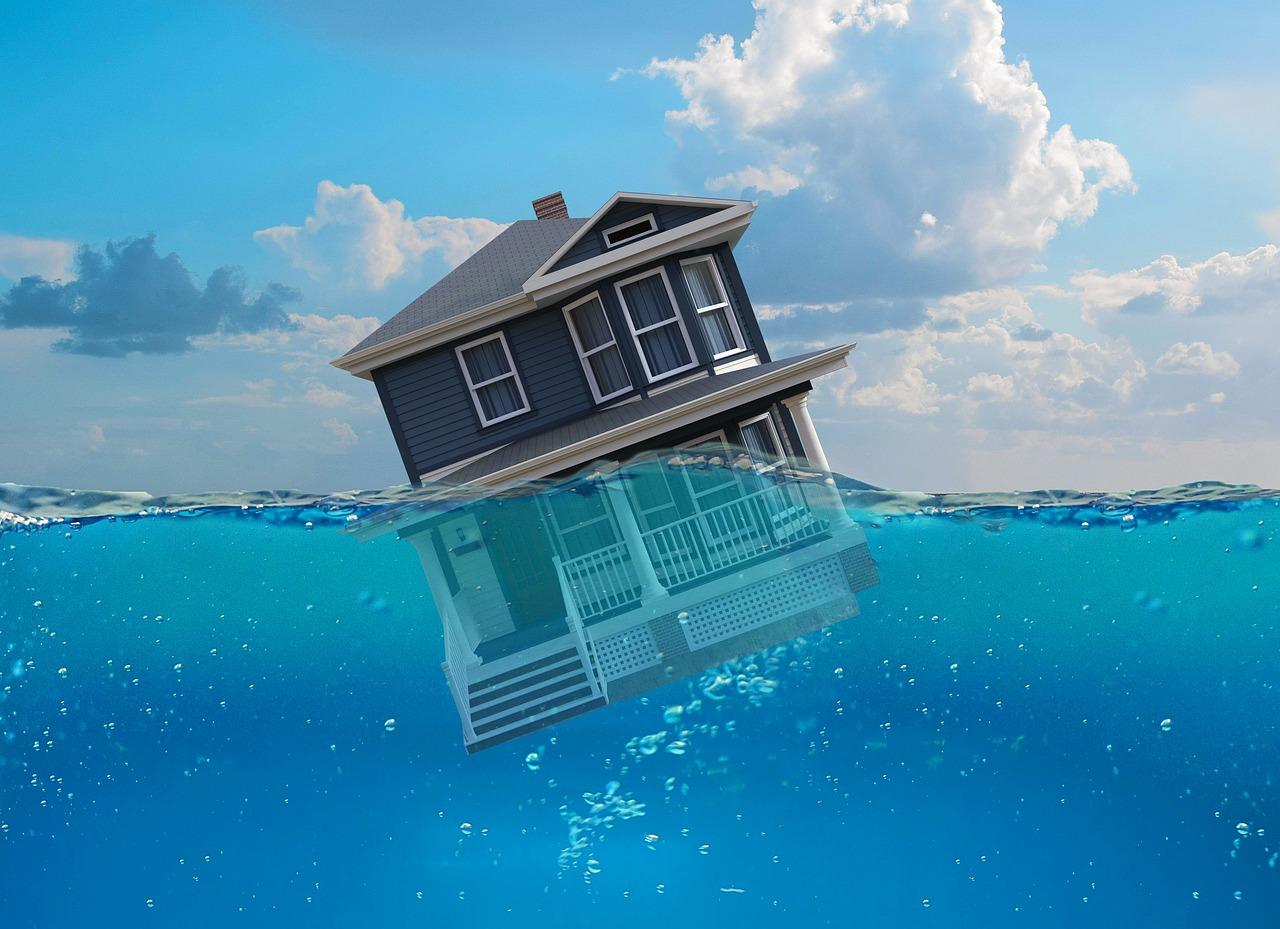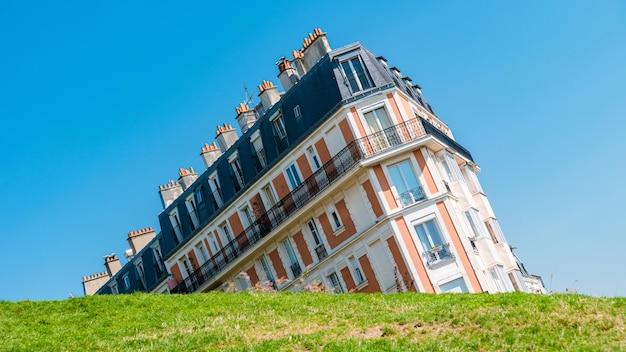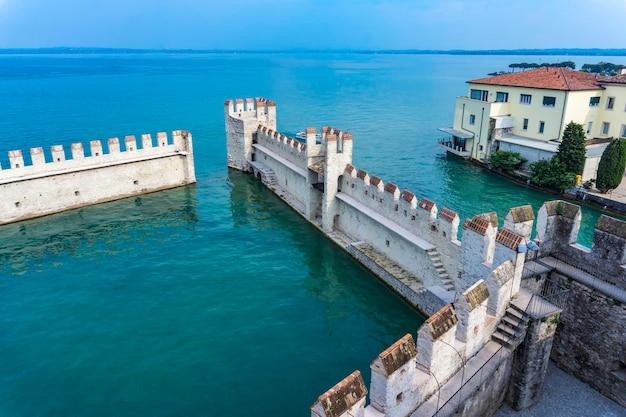Have you started to notice cracks in your walls or uneven floors in your home? If you have, it might be a sign that your house is sinking. This can happen due to a variety of reasons, some of which may be covered under your insurance policy, while others may require costly repairs. In this blog post, we’ll explore the signs of a sinking house, how to fix it, and the associated costs. So, if you want to learn how to stop your house from sinking, keep reading!
Signs of House Sinking
Upon discovering that your house is sinking, the first thing that comes to mind is panic. You might start wondering why something like this happens and what you could have done to prevent it. But fret not, as there are several signs to look out for that could indicate that your house is sinking. These signs may include:
Uneven or Sloping Floors
Do you ever feel like you’re walking uphill in your own home? Uneven or sloping floors are one of the most visible signs of house sinking. Over time, the soil beneath your foundation may shift, causing one part of your floor to be higher or lower than another.
Cracks in Walls, Floors, and Ceilings
If you notice small cracks in your walls, floors, and ceilings, it may be a sign that your house is sinking. These cracks usually start as hairline fractures but can widen over time if the sinking persists.
Stuck or Misaligned Doors and Windows
When a house is sinking, the foundation shifts, causing the doors and windows to shift as well. You may notice that doors and windows that usually open smoothly now stick or are misaligned.
Sagging or Uneven Roofline
The roofline is usually a great indicator of the overall condition of your house. If you notice that the roofline is sagging or uneven, it could be a sign of house sinking.
Puddles in the Basement
Another sign of house sinking is water accumulation in the basement. If you notice puddles forming in your basement, it could mean that the foundation is sinking and that water is seeping in through cracks.
In conclusion, house sinking can be a scary experience if not detected early. If you notice any of these signs, it’s vital to seek professional help immediately to prevent further damage.
Sinking House Repair Cost
Are you wondering how much it would cost to repair a sinking house? Well, the bad news is that it can be pretty costly – but the good news is that it doesn’t always have to be. Here’s what you need to know about the sinking house repair cost before you start panicking and moving into a treehouse.
Hire a Professional or DIY
First things first: you need to decide if you should hire a professional or do it yourself. Sure, DIY is a cheaper option, but keep in mind that it can be dangerous, time-consuming, and ineffective if you don’t know what you’re doing. On the other hand, hiring a professional can seem expensive, but it’s worth every penny if it saves your house from further sinking or collapsing.
Types of Sinking House Repair
The type of repair that your sinking house needs will determine the cost. Usually, there are three types of sinking house repair: underpinning, slabjacking, and piering. Underpinning involves excavating soil from underneath the foundation and reinforcing it with new concrete or steel piers. Slabjacking involves injecting a mixture of cement and water underneath the sinking concrete slab to lift it. Piering involves driving steel piers or helical anchors into the ground deep beneath the foundation to stabilize it.
Factors that Affect Repair Cost
Besides the type of repair needed, there are many other factors that can affect the sinking house repair cost. Some of them include:
- The size and weight of the house
- The type of foundation (e.g., concrete slab, crawl space, or basement)
- The extent of damage (e.g., minor settling or major sinking)
- The accessibility of the site (e.g., urban or rural)
- The local property and building codes
- The cost of materials and labor in your area
Average Cost of Sinking House Repair
Now, here comes the moment you’ve been waiting for – how much does sinking house repair cost on average? Well, it’s hard to put an exact price tag on it, as every case is unique. However, according to HomeAdvisor, the national average cost for foundation repair is $4,073, with most homeowners spending between $2,107 and $7,025. Keep in mind that these numbers can vary greatly depending on the factors listed above.
In summary, repairing a sinking house can be a costly and complex process, but it’s not impossible. By understanding the types of repair, the factors that affect the cost, and the average price range, you can make an informed decision on how to proceed. Whether you choose DIY or hire a professional, make sure you do your research, get multiple quotes, and prioritize your safety and the safety of your home.
How to Fix a Sinking House
If you’ve determined that your house is sinking, you might feel overwhelmed and at a loss on what to do next. Fortunately, you have options to fix the issue and prevent your house from sinking even more. Here’s how to fix a sinking house:
Hire a Professional Engineer
Before you attempt any repairs, it’s crucial to hire a professional engineer to evaluate the extent of the damage and the underlying cause of the sinking. A professional engineer will assess the soil conditions, foundation type, and structural issues to devise a tailored solution that fits your needs. They will also create a detailed report that outlines the repairs needed and the estimated costs.
Repair the Foundation
Repairing the foundation is one of the most effective ways to fix a sinking house. Different methods can be used to repair the foundation depending on the cause of the sinking. Some common methods include underpinning, concrete leveling, or hydraulic jacking. Your engineer will recommend the best approach for your specific situation.
Install Drainage Systems
If your house is sinking due to moisture-related issues like poor drainage or soil erosion, installing drainage systems can alleviate the pressure on the foundation and prevent further sinking. Installing a French drain or an exterior drain tile system can redirect the water away from your foundation.
Fix The Cause of The Moisture Issues
To prevent your house from sinking in the future, you need to address the underlying cause of the moisture issues. If your house is built on clay soil that expands and contracts with moisture changes, you might need to install a moisture barrier or stabilize the soil. If the moisture issues are caused by poor grading or gutter systems, fixing or replacing them will prevent further sinking.
Fixing a sinking house can seem daunting, but with the right approach and professionals on your side, your house can be restored to its former glory. It’s essential to act quickly to prevent further damage and avoid costly repairs. By following the steps outlined above, you can fix a sinking house and ensure its safety and longevity.
Signs Your House is Sinking
As hilarious as it may seem, houses can sink! Not only can this cause structural defects, but it can also mess with the state of one’s mental well being. Here, we will discuss the signs that point towards this occurrence. Anyone acquainted properly with their house will easily be able to figure out these occurrences. Don’t say we didn’t tell you sooner!
Uneven Floors
One significant indication that your house is sinking is uneven floors. If you start feeling as though you are in a funhouse at the state fair, then your house is probably sinking. It would be best if you got out of there before it sinks altogether. Make sure to put on your clown shoes to stay prepared for any uneven ground you might encounter.
Cracks on Walls
Have you ever seen a horror movie that begins with the protagonists noticing cracks on the walls, and they ignore them only for their house to sink overnight? Ok, that might not happen, but you get the point. If you notice cracks along your walls, it is a clear indicator that your house is sinking. Unless you’re shooting a horror movie, it would be best to get it looked at soon enough!
Jamming Doors and Windows
Houses can become specific if they sink into the ground, and while this may sound like a fun ‘house exploration,’ it most certainly isn’t. Jamming doors or windows are an indication of a severe problem concerning your home’s foundation. You might need to get them fixed and check if the house is sinking while you’re at it.
Uneven Roof Lines
Houses are not designed to bend like trees, and as such, any signs of a bend or dip on any of the roof lines is an indication that your foundation is in trouble. Take the necessary precautions, and always remember to bring an umbrella — just in case it starts raining indoors.
Leaning Chimneys
Finally, one of the most tell-tale signs that your house is sinking is when you notice any leaning chimneys. If you see any crooked chimneys, then you should rightfully feel paranoid about the state of your home. It could potentially cause damages to your roof, leading to water damage. Don’t ignore this symptom.
These are the signs of a sinking home; don’t ignore them. They might turn a dream house into a nightmare before one realizes what happened.
Why did my house sink in sims 4
If you’re into simulating the perfect life on Sims 4, then you’ve probably encountered situations where your house starts sinking, your furniture floating, and your gameplay ruined. To help you understand why this is happening, we’ve compiled a list of reasons why your house could sink in Sims 4.
Faulty foundation
The foundation of your house is the most critical part of building in Sims 4. If you don’t lay the foundation correctly, your house will start sinking. Make sure you use the appropriate foundation tool and choose the correct height for your terrain.
Oversized objects
Another possible reason why your house is sinking could be due to placing oversized objects. When you place large objects like a massive pool or a building that doesn’t fit on your lot correctly, it can make your house unstable and start to sink.
Too many floors
The number of floors in your house can also make your Sims 4 house sink. If you add too many stories to your house, it can cause the foundation to weaken. Try to limit your house to three floors or less to avoid this situation.
Poorly placed floor tiles
Misplacement of floor tiles is one of the common mistakes Sims 4 gamers make. If you don’t measure the floor precisely before laying out the tiles, your house may be uneven, which can cause it to sink and become unstable.
Natural disasters
Lastly, Sims 4 various natural disasters can cause your house to sink. For instance, if a natural disaster like a hurricane or tornado occurs in Sims 4, the high winds and flooding can cause your house to sink.
So, there you have it, the reasons why your house keeps sinking in Sims 4. By keeping these tips in mind, next time you play the game, you can avoid your house sinking and focus on your virtual life.
Is it Normal for a House to Sink
It’s perfectly normal for a house to sink, just like it’s normal for a person to gain weight as they age. But just like an unhealthy lifestyle can cause rapid weight gain, certain factors can cause your house to sink rapidly too.
What Causes a House to Sink
Numerous factors can cause a house to sink, including:
-
Soil shrinkage: This mostly occurs in areas with clay soils that expand when moist and contract when dry. The constant expansion and contraction cause the soil to settle over time, leading to foundation problems.
-
Poor construction: Inexperienced builders may use improper construction techniques or low-quality materials that can cause a house to sink.
-
Underground water: A high water table or underground water can cause the soil to become unstable, leading to foundation issues and house sinking.
Signs that Your House is Sinking
If you’re wondering whether your house is sinking, keep a lookout for these tell-tale signs:
- Cracks in the walls and floors
- Uneven flooring
- Sticking doors and windows
- Sagging or uneven roofline
- Separation of walls from ceiling or floors
How to Prevent House Sinking
Although some sinking is normal, you can prevent it from escalating by taking the following precautions:
-
Proper drainage: Ensure water drains away from your house to prevent water from accumulating around the foundation.
-
Soil stabilization: Hire a professional to stabilize the soil and reinforce the foundation.
-
Proper construction: Ensure your house is built by licensed and experienced builders who use high-quality materials and proper construction techniques.
-
Regular maintenance: Regularly inspect your house for any signs of sinking and address the issues promptly before they escalate.
Now that you understand why your house may be sinking, don’t panic. With proper maintenance and precautions, you can ensure your home stands strong for years to come.
House Sinking Covered by Insurance
If you’re noticing that your house is sinking, the last thing you want to worry about is whether your insurance company will cover the repairs. Fortunately, most homeowner’s insurance policies do cover house sinking caused by certain events or disasters.
Covered Events
The events that usually cause house sinking are natural disasters such as earthquakes, flooding, and landslides. If your house sinking is due to one of these events, it’s likely that your insurance policy will cover the cost of repairs.
Exclusions
However, not all insurance policies cover house sinking caused by events that are considered man-made or not covered under the policy. For example, if your foundation is sinking due to poor construction or maintenance, your insurer may not cover the repair costs. Additionally, if your policy specifically excludes coverage for sinkhole damage, you won’t be able to claim for any repairs.
Get in Touch with Your Insurer
The best way to know if your house sinking is covered is to contact your insurer and ask. They will investigate the cause of the sinking to determine if you are eligible for compensation. Don’t wait until the damage is done before finding out if you’re covered. Reach out to your insurer to discuss your coverage options before you need them.
House sinking is a serious issue that needs to be addressed immediately to avoid further damage. Knowing whether you’re covered by insurance can provide peace of mind and a sense of security. Remember to always read and understand your homeowner’s insurance policy to know what’s covered and what’s not before disasters strike.
How to Keep Your House from Sinking
It might sound crazy, but keeping your house from sinking is easier than you might think. Here are some practical tips:
Check Your Foundation
Your foundation is the backbone of your house, so it’s important to keep an eye on it. Look for any cracks or signs of wear and tear. Catching these issues early can help prevent bigger problems down the road.
Water Your Lawn
Believe it or not, keeping your lawn watered is actually important for keeping your house from sinking. When the ground around your house dries out, it can cause your foundation to shift. So, get out there and give your lawn a good watering!
Keep Your Gutters Clean
Clogged gutters can lead to water damage in your foundation. Make sure to clean your gutters regularly to prevent any potential damage.
Install Proper Drainage
In addition to watering your lawn, proper drainage around your house is crucial for preventing your house from sinking. If your yard doesn’t have natural drainage, consider installing a French drain or other drainage system.
Build on Solid Ground
If you’re building a new house, it’s important to make sure you’re building on solid ground. Check with a professional before you start building to ensure a solid foundation.
By following these simple tips, you can help prevent your house from sinking and keep it on solid ground. So, go forth and keep your house standing strong!
What Are the Telltale Signs of a Sinking House
If you have noticed your doors not closing correctly or your floors sloping, it could be a sign that your home is sinking. Here are some other signs to look out for:
Cracks on the Walls
If you see cracks in your interior and exterior walls, it could indicate that your foundation is sinking. Check for stair-step cracks, vertical cracks, and even diagonal cracks.
Uneven Floors
An uneven floor is a sign that your foundation is not level. If the floor slopes towards one corner of the room, it could be because the foundation is sinking.
Windows That Stick
If your windows are difficult to open or close, it could be a sign of foundation problems. The movement of the foundation can cause the window frames to become distorted, making opening and closing them challenging.
Sagging Ceilings
If your ceiling starts to sag, it could be because the foundation is sinking. As the foundation sinks, it causes the whole house to shift, leading to the ceiling sagging.
Gaps Between Walls and Floors
If you see gaps between your walls and floors, it could mean that your foundation is sinking. The movement of the foundation can cause the walls to become separated from the floors.
Doors That Stick
Doors that are difficult to close or that scrape the floor when opening and closing can also indicate foundation issues. The foundation movement can cause the doorframes to distort, making it challenging to open and close the doors.
In conclusion, a sinking house can be a significant problem that can cause safety hazards. Always keep an eye on these signs and act quickly if you notice any of them.
Does Insurance Cover Sinking Foundations
Whether or not your homeowners’ insurance policy covers a sinking foundation can depend on a few factors such as the root cause of the sinking, the severity of the damage, and the specific policy terms and conditions.
Root Cause
One crucial factor that insurance providers always consider is the root cause or reason behind the sinking foundation. If the sinking foundation is due to natural disasters like floods, earthquakes, and hurricanes, typical home insurance policies may not cover the damage. However, if the damage is caused by a sudden or unexpected event like a burst pipe or a gas leak, your insurance coverage might help you repair the damages.
Policy Terms and Conditions
Before signing up for any policy, it’s crucial to carefully read and understand the policy terms and conditions, including exclusions, inclusions, and limitations. Check your policy documents for coverage regarding damages to structures or anything related to foundation repairs.
Severity of Damage
Another crucial factor in determining whether or not your homeowner’s insurance policy covers your sinking foundation is the severity of the damages. Damage that is considered minimal is unlikely to be covered. However, if the sinking is extensive and poses a significant risk to the home’s safety, your policy may cover the damages.
Bottom Line
In some instances, a sinking foundation can be a sign of an underlying problem like poor construction, drainage issues, or soil conditions. This means that repairing the damage may not be enough to solve the problem entirely. It’s essential to understand that insurance claims can be complicated, and if your policy may cover the damage, it’s best to contact your insurance provider to discuss the claim process.
Why Does My House Feel Like It’s Sinking
You’re sitting in your house, and suddenly, you feel like the ground beneath your feet is moving. You look around, but nothing seems to be out of place. However, you can’t shake the feeling that something is not right. Why does your house feel like it’s sinking? Here are a few reasons why you might be experiencing this odd sensation.
Foundation Problems
The foundation of your house provides the structural support that keeps your home from sinking into the ground. However, if the foundation is damaged, your house may start to feel like it’s sinking. Some of the signs that you have foundation problems include cracks in the walls or floors, uneven floors, and doors or windows that won’t close properly.
Uneven Settlement
When you build a house, the weight of the building settles into the ground over time. This is called settlement. However, if the settlement is uneven, your house may feel like it’s sinking in some areas but not others. This could be due to differences in the soil or the way the house was constructed.
Earthquakes or Natural Disasters
If you live in an area prone to earthquakes or other natural disasters, your house may feel like it’s sinking during or after one of these events. This can be due to the shifting of the ground or damage to the foundation. If you suspect that your house has been damaged by a natural disaster, it’s essential to have it inspected by a professional.
Poor Drainage
If water is pooling around your house’s foundation, it can cause the soil to become unstable, leading to sinking or settling. Clogged gutters, downspouts that empty too close to the foundation, and improper grading can all contribute to poor drainage around your house. By resolving these issues, you can prevent further sinking and damage to your home.
If you’re experiencing the sensation that your house is sinking, it’s essential to investigate the cause. By addressing the underlying issue, you can prevent further damage to your home and ensure your family’s safety. While it may be tempting to ignore the problem, it’s always better to be safe than sorry.



